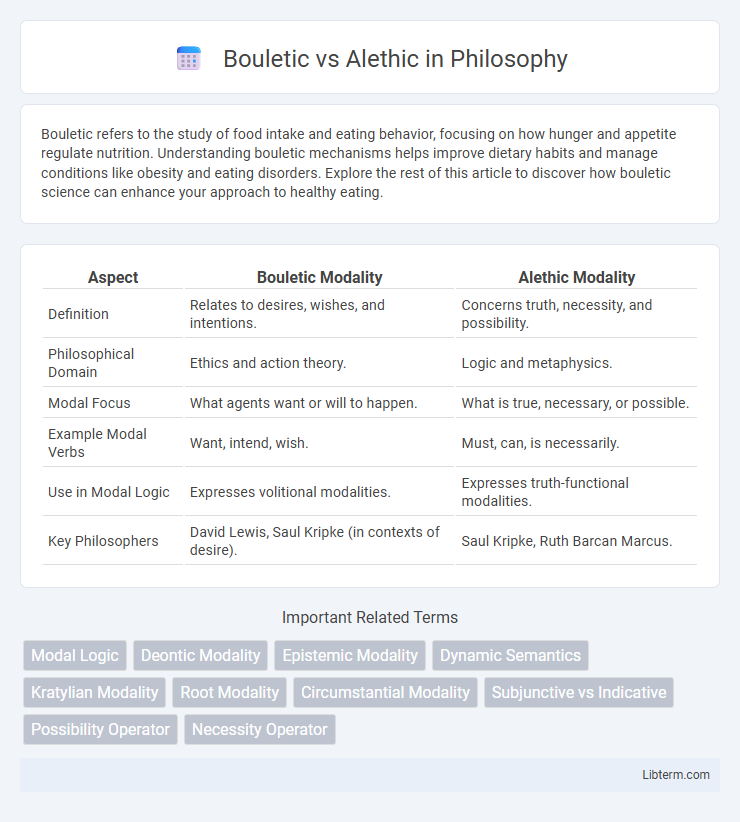Bouletic refers to the study of food intake and eating behavior, focusing on how hunger and appetite regulate nutrition. Understanding bouletic mechanisms helps improve dietary habits and manage conditions like obesity and eating disorders. Explore the rest of this article to discover how bouletic science can enhance your approach to healthy eating.
Table of Comparison
| Aspect | Bouletic Modality | Alethic Modality |
|---|---|---|
| Definition | Relates to desires, wishes, and intentions. | Concerns truth, necessity, and possibility. |
| Philosophical Domain | Ethics and action theory. | Logic and metaphysics. |
| Modal Focus | What agents want or will to happen. | What is true, necessary, or possible. |
| Example Modal Verbs | Want, intend, wish. | Must, can, is necessarily. |
| Use in Modal Logic | Expresses volitional modalities. | Expresses truth-functional modalities. |
| Key Philosophers | David Lewis, Saul Kripke (in contexts of desire). | Saul Kripke, Ruth Barcan Marcus. |
Introduction to Bouletic and Alethic Modalities
Bouletic and alethic modalities represent distinct aspects of modal logic, with bouletic modality relating to desires, wishes, and volition, while alethic modality deals with necessity, possibility, and factual truth. Bouletic modality is essential for understanding statements about what agents want or intend, capturing preferences and normative considerations. Alethic modality centers on the logical status of propositions, addressing what is necessarily true or possibly true within a given framework.
Defining Bouletic Modality
Bouletic modality primarily concerns desires, wishes, and intentions, reflecting what an agent wants or aims to achieve. It expresses the volitional attitudes toward states of affairs, often modalized by verbs such as "want," "wish," or "prefer." In contrast, alethic modality deals with necessity and possibility relating to truth and reality conditions, focusing on what is logically or metaphysically necessary or possible.
Understanding Alethic Modality
Alethic modality pertains to the necessity and possibility of truth, reflecting logical and metaphysical aspects such as what must be true or could be true in all possible worlds. Unlike bouletic modality, which expresses desires, wishes, or volition, alethic modality deals with objective truths and necessities independent of human intention. Understanding alethic modality involves analyzing propositions in terms of their truth conditions, necessary truths, and logical possibilities, essential for modal logic and philosophical inquiry.
Key Differences Between Bouletic and Alethic
Bouletic modality refers to expressions of desire, wishes, or preferences, while alethic modality concerns necessity, possibility, or factual truth. Bouletic statements often use verbs like "want," "hope," or "wish," contrasting with alethic statements that involve terms such as "must," "can," or "is necessarily." Understanding these distinctions clarifies how language encodes subjective desires versus objective truths in modal logic and linguistics.
Linguistic Examples of Bouletic Modal Expressions
Bouletic modal expressions in linguistics reflect desires, wishes, or intentions, often conveyed through verbs like "want," "hope," or "wish," as in examples such as "I want to leave" or "She hopes to succeed." These expressions contrast with alethic modality, which pertains to necessity and possibility regarding truth, exemplified by "You must finish your work" or "It can rain today." Bouletic modality primarily encodes personal attitudes towards potential actions, making verbs of volition and desire key semantic markers within this category.
Linguistic Examples of Alethic Modal Expressions
Alethic modality in linguistics expresses necessity, possibility, and impossibility based on logical or metaphysical truth, often using modal expressions such as "must," "cannot," and "possible." For example, "The sun must rise tomorrow" illustrates alethic necessity, while "It cannot be both raining and not raining simultaneously" demonstrates alethic impossibility. These modal verbs convey truths about states of affairs rather than desires or intentions, distinguishing alethic modality from bouletic modality, which relates to wishes or desires.
Bouletic vs Alethic in Natural Language Semantics
Bouletic modality in natural language semantics expresses desires, wishes, or intentions, often associated with volitional states of agents, whereas alethic modality concerns necessity and possibility related to truth conditions and logical entailments. Bouletic statements typically involve verbs like "want," "wish," or "prefer," reflecting subjective motivational attitudes, while alethic statements hinge on modal operators such as "must," "can," or "cannot," indicating objective modal truths. Understanding the distinction between bouletic and alethic modalities is crucial for accurately modeling meaning variations in modal expressions across different linguistic contexts.
Cross-Linguistic Perspectives on Bouletic and Alethic
Cross-linguistic perspectives on bouletic and alethic modalities reveal diverse semantic structures that shape how languages encode desires and necessities. Bouletic modality, expressing wishes or desires, often employs specific verb forms or particles distinct from alethic modality, which conveys logical or metaphysical necessity like possibility and impossibility across languages. Comparative studies highlight that some languages merge alethic with epistemic modality, while others maintain strict syntactic distinctions, reflecting cultural and cognitive variations in modality representation.
Practical Applications in Syntax and Semantics
Bouletic modality expresses desires, wishes, or preferences, while alethic modality concerns necessity, possibility, or logical certainty. In syntax, bouletic modalities often appear in imperative or optative moods to convey commands or hopes, whereas alethic modalities are encoded through modal verbs like "must" and "can" to indicate constraints on truth conditions. Semantically, understanding the distinction aids in interpreting speaker intent, guiding natural language processing applications such as sentiment analysis and automated reasoning systems.
Conclusion: Significance of Bouletic and Alethic Modalities
Bouletic and alethic modalities are essential in understanding human reasoning and linguistic expression, as they differentiate between desires or intentions (bouletic) and necessary truths or possibilities (alethic). Recognizing these distinctions enhances clarity in philosophical arguments and modal logic by precisely categorizing statements based on volition versus necessity. This differentiation is crucial for effective communication, decision-making, and the philosophical analysis of language and thought.
Bouletic Infographic

 libterm.com
libterm.com